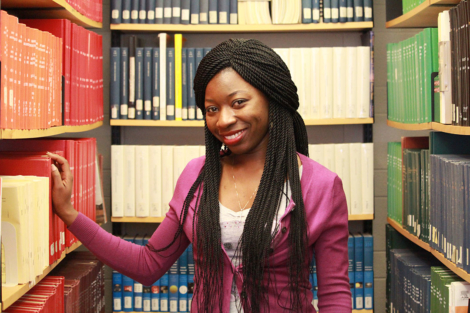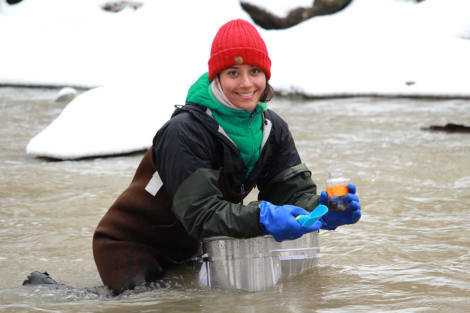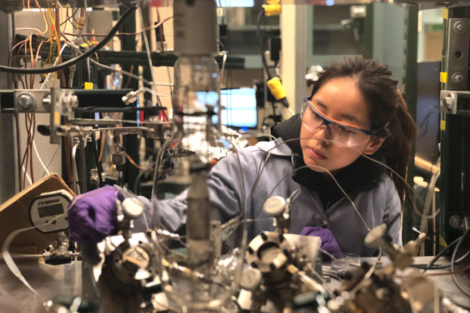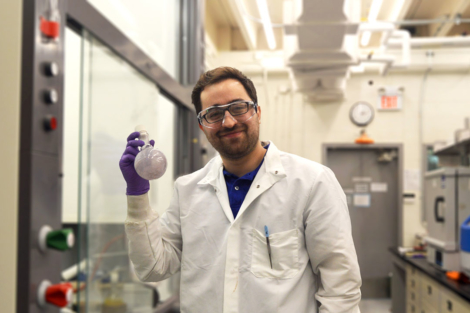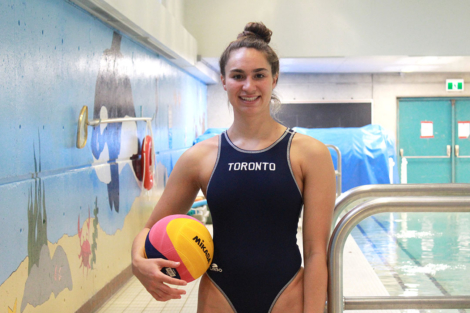[dropcap]W[/dropcap] hat does a scientist look like? For many, the answer involves white lab coats, goggles, and beakers. Yet the people who pursue science are just as diverse as the field itself. Scientists can be activists, athletes, artists, or all of the above. Science can happen indoors or outdoors, under the night sky, or on the internet. Read about the journeys of seven student researchers at U of T.
“As a little girl, I saw a shooting star, and that made the night sky my favourite view. I thought a lot about what was up there and how cool it would be to go to space. This led to my studying physics and astronomy in undergrad and I have never looked back since then.
I currently seek to understand the early universe and how it transitioned to the stars and galaxies we see today. Specifically, what happened in the [epoch] of re-ionization. The epoch of re-ionization is a period in the universe’s history over which the matter in the universe ionizes again.
[My dad] taught me always to strive for more, that there could always be a way if there is a will. He taught me to never give up and to always ask questions. My curiosity in life and career comes from him.”
— Margaret Ikape, first-year PhD in Astronomy and Astrophysics, email
“I have always been interested in science, but also equally interested in the arts. I went to an arts middle school and high school where half my day was spent doing art and not academics. I spend a lot of my time outside of school engaging in the arts. I still consider myself an artist as much as I consider myself a scientist. It took me a while to come to terms with the fact that I can [be] both.
When I decided I wanted to go to university, I chose to study science since I liked it and was good at it. Moving into my later years of my undergrad I found that I was drawn to ecology courses, field courses, and also really liked the people I met in those classes.
I am interested in the pollutants, that comes from roads, such as road salt, and how it impacts the animals that live in nearby streams. I also study other pollutants that come from roads, such as metals, polycyclic aromatic hydrocarbons, and small bits of car tires (tire dust).”
— Rachel Giles, first-year Master’s in Ecology and Evolutionary Biology, email
“Initially I had my heart set on being a professional dancer and veterinarian (a very practical dual career). Science had been my academic focus for some time, but it took several years after completing my BSc for me to realize that I passionately loved research and applying the scientific method to various questions of animal behaviour and cognition. I had this epiphany while I was juggling three jobs as a lab manager, veterinary assistant, and dog trainer. Out of all of those, I found research to be fulfilling and exciting and it was something I could see myself doing for the rest of my life.
I want to know how [dogs] perceive the world and how they process cues and information present in the environment. I am motivated by the hope that my research can possibly help change how people view dogs, give greater value to them through the recognition of their mental abilities and ultimately lead to greater wellbeing and better access rights in North America.”
— Julia Espinosa, second-year PhD in Cognitive Psychology, email
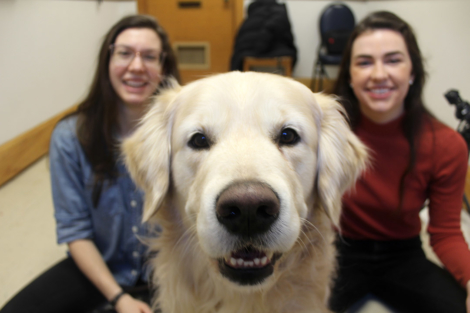
Julia Espinosa (left) and Madeline Pelgrim (right) work with dogs like Loki to determine animal behaviour. ASHIMA KAURA/THE VARSITY
“Julia Espinosa, the graduate student in my lab, has had the greatest influence on my career. She has been endlessly patient with me since we began working together in the fall of 2016, and has pushed me to advocate for myself and not be afraid to try something new. I would not be at this point in my career without her sage advice and constant confidence.
Like many other students, I had a bit of a rough transition into University in my first year. Adjusting to life away from home (my hometown is a 10 hour drive from Toronto) and everything that comes with living on your own for the first time caused my academics to suffer. When I first applied to join my lab, I was confident that I would not be accepted because of my marks. I am very thankful for my Principal Investigator — Dr. Buchsbaum — and the lab manager at the time — Kay Otsubo — for taking a chance on me and overlooking my performance first-year.”
— Madeline Pelgrim, fourth-year Bachelor’s in Psychology and Biology, email
“There are definitely a lot of challenges throughout a PhD. I would say the biggest one for me were the mental challenges at the early stage of my PhD. How do I keep being confident in front of the language barrier, failure experiments, competitions, and where is my direction for the future? Having been through such a mental struggling stage, I am now clearer of myself, and ready for unknowns.
I always want to help bring positive impacts to our future world. I like the discovery and innovation side of research studies and its potential impact on our better world. My research is to design advanced photo-responsive nanomaterials that can store solar energy into chemical energy by catalyzing the conversion of greenhouse gas carbon dioxide to useful chemicals and fuels. It is a promising solution to reduce the usage of fossil fuels and global warming caused by greenhouse gas.”
— Yuchan Dong, fifth-year PhD in Materials Chemistry, email
“As a child while it was true that I was always curious about nature and the world around us — Asking questions like why is the sky blue? How are clouds formed? etc. It was only when I got older and started to understand ‘what is science? what are scientists? How is science performed?’ that I gained a tremendous passion for it.
This notion that with a few chemical reactions, chemists can ‘creatively’ and rationally generate a molecule which when administered to human can halt disease progression, pain and even extend life — was a very powerful catalyst for my interest in medicinal chemistry. My work mainly focuses on the development of novel small-molecules that specifically target disease-causing cellular components which have been shown to cause certain cancers.
I think as with any budding student of science, whether in graduate studies, professional programs or even out in the workforce, the biggest challenge is to become comfortable with and know how to effectively deal with failure and hardship. As a scientist, at times we learn more from failed experiments than successful ones.”
— Yasir S. Raouf, third-year PhD in Organic and Biological Chemistry, email
“I’ve been both playing sports competitively and going to school since I was six years old. Honestly, if I didn’t play water polo I don’t know what I would be doing in the evenings — I think I would just be sitting on my phone doing nothing. I love to represent Canada, and it’s a really exciting opportunity to do so on an international stage. Looking forward to the future, it would be an honour to represent Canada at the Olympic Games. U of T has opened so many doors for me, with research and athletics.
Initially I came to U of T and I wanted to do Genetics and Cell & Systems Biology — all that nitty gritty stuff. Then I took BIO230, and I was like this is not for me. I was trying to figure out a field where I could apply Life Science techniques, but without wet lab stuff. I had the opportunity to do an ROP [Research Opportunity Program] in Pascal Tyrrell’s lab — which is focused on medical imaging and statistics — and just fell in love with it.”
— Rachael Jaffe, third-year Bachelor’s in Global Health, Statistics, and Economics, spoken


